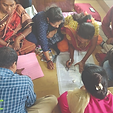
An AI-Powered Platform
for Inclusive Governance
A modular, multilingual digital enumeration tool with built-in quality checks and an eligibility engine that brings vulnerable and often invisible communities to the forefront of governance.

Across India, millions who keep cities running like the sanitation workers, waste pickers, domestic workers, and other informal labourers, continue to remain outside formal data systems. Their work sustains urban life, yet the absence of verified records leaves them excluded from welfare schemes, safety measures, and recognition within governance structures.
Quneiform bridges this gap. An AI-powered, multilingual Gov-Tech platform, it enables governments to identify, profile, and support vulnerable populations through ethical, verifiable, and scalable data systems, bringing visibility, dignity, and accountability to urban governance.
What is

?
Quneiform is an AI-powered, home-grown Gov-Tech platform built by the Urban Management Centre (UMC) to fill a critical data gap in India’s governance, helping identify and support vulnerable groups such as sanitation workers, waste pickers, migrant labourers, women, and persons with disabilities.
Designed for India’s diverse contexts, Quneiform works offline, in multiple languages, and with built-in quality checks to ensure accurate, reliable data collection. Its AI-driven localisation enables quick translation and deployment of digital surveys tailored to local governance systems.


Trusted by Governments Across India
Types of Surveys Powered by

Quneiform is already in use across India, powering a wide range of data collection efforts for more inclusive and responsive governance. From municipal operations to social welfare schemes, it is helping governments gather information they need, when and where it matters most.
Quneiform adapts to the context, language, and governance needs, making it one of the most flexible tools for inclusive urban data systems.
Sanitation Workers
& Waste Pickers

Enumerating workers for their safety and dignity.
Heritage Mapping

Supporting zonal planning by listing and grading heritage precincts.
Entitlement Linkage

Gap identification and linkage with government schemes.
Local Government Services

Assessing Water, Sanitation, SWM, Health, Transport services etc.
Property Tax
Improving tax systems through household mapping.

Enable real-time tracking of programmes, schemes and services.
Monitoring Learning
and Evaluation

From Data Collection to
Verified Beneficiary Records

Scaling Equity Through Data
From Data to Dignity
With over 320,000 sanitation and informal workers enumerated across 4,800 cities, Quneiform has powered transformative programmes such as Garima (Odisha), SWDS (Tamil Nadu), and the national NAMASTE scheme.
Its intuitive interface enables even Self-Help Group (SHG) members to conduct surveys confidently in the field. Beyond identification, Quneiform assigns unique worker IDs and uses its AI-powered eligibility engine to link individuals with the welfare schemes they qualify for making delivery faster, transparent, and accountable.



